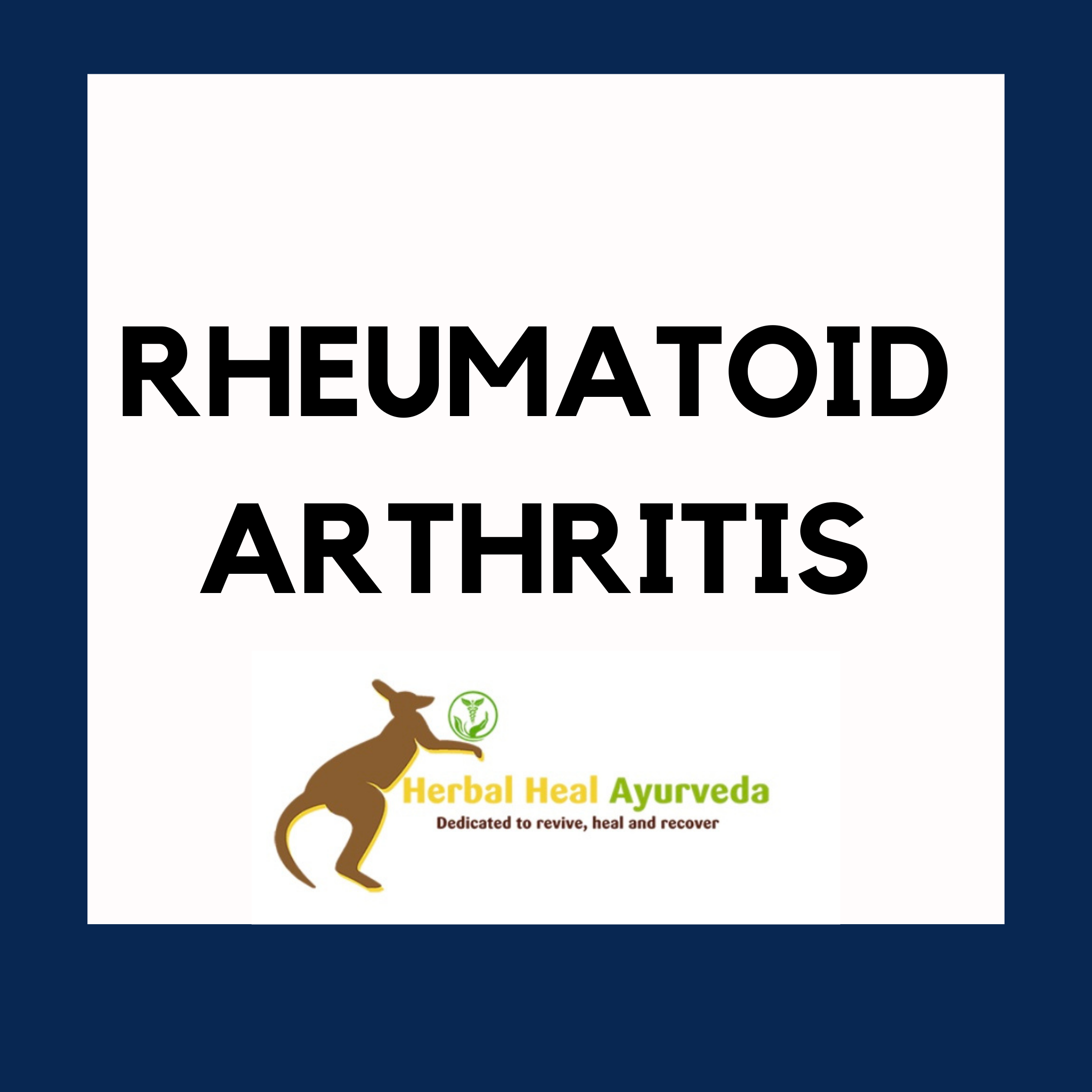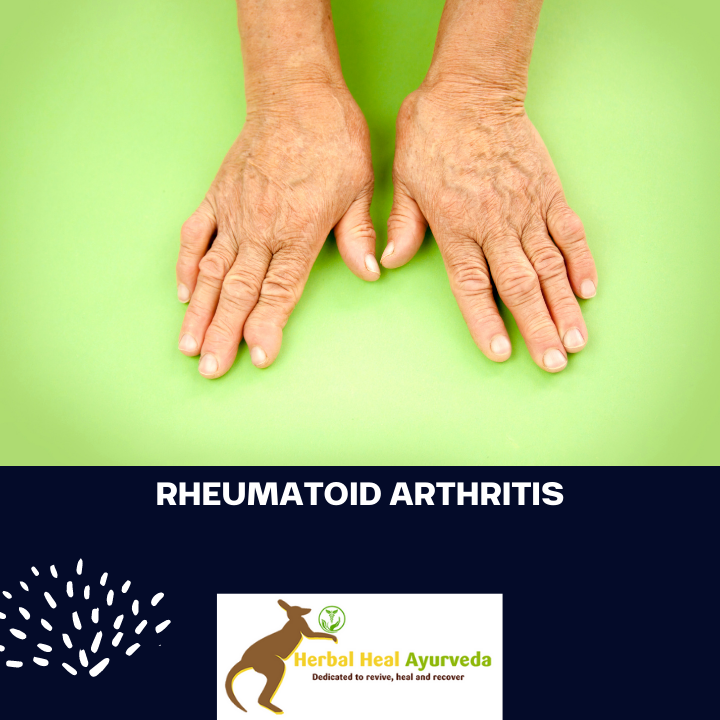Rheumatoid Arthritis
Rheumatoid Arthritis (RA) is a chronic systemic Autoimmune Inflammatory condition of joints of hands and feet.
In this condition, the body's immune system mistakenly attacks its own healthy body tissue leading to erosion of joints and, in severe cases, even damage to the internal organs.


Causes of Rheumatoid Arthritis:
Rheumatoid Arthritis is an Autoimmune disorder with no known cause. Basically, due to the formation of an immune complex within the joints have been approved as one of the leading causes of RA.
Besides this, it has been analysed that Rheumatoid Arthritis occurs by a combination of genetic, hormonal and environmental factors. Specific Genes of our body get triggered due to the attack of viruses, bacterial, physical and emotional stress bringing changes to our immune system and finally attacking the synovium of the joints.
Signs and symptoms:
Rheumatoid Arthritis has various signs and symptoms, a few important ones are listed below:
- Pain in the smaller joints of hands and feet
- Proximal interphalangeal joints commonly bear the first episode of attack. They are swollen, tender and hot.
- Morning stiffness is prominent.
- Excessive sweating of palms and soles.
- General Body weakness, fatigue and body malaise.
- Z deformity of the thumb, broad foot with hammer toe deformity.
- Ulnar deviation of metacarpophalangeal and wrist joints associated with Swan neck deformity of the fingers
- Palmar erythema is detected.
- Lymph node enlargement is seen.
- Haemorrhagic infarcts in the nail folds.
Risk factors
- Age- Common in Adults and middle-aged subjects.
- Gender- Common in females (3:1)..
- Smoking and exposure to toxins- These cause oxidative stress and increase the chance of developing RA by increasing the frequency of the body's inflammatory response.
- Emotional and physical stress plays an essential role in developing RA.
- Obese people have the risk of developing RA earlier.
- Disruption in hormonal balance, such as after early menopause.
- Unhealthy gut microbiome.
- History of infections such as septic foci in teeth, tonsils, gums or anywhere plays some part.
Diagnosis
Rheumatoid Arthritis is diagnosed from a combination of things mentioned below.
1. Symmetrical involvement of the same joints on both sides of the body, especially hands.
2. Rheumatoid nodules over the bony prominence, extensor surface.
3. Morning stiffness in and around joints lasting for 1 hour.
4. Arthritis of three or more joints.
5. Results of blood test and X-Ray.
- BLOOD TESTS
Low Haemoglobin percentage and RBC count is detected in patients of RA.
Erythrocyte sedimentation rate (ESR) is raised.
C- reactive protein (CRP) is high and confirms the presence of inflammation.
Cyclic citrullinated peptide antibody test (anti-CCP) is positive in patients with RA.
- X-Ray
An X-Ray of the joint shows mouse eaten appearance due to erosion. Joint spaces diminished in the late stages. Bone ends may show Osteoporosis.
Rheumatoid Arthritis : Ayurvedic View
According to Ayurveda, Rheumatoid Arthritis has been compared to a clinical condition known as Amavata.
Amavata is made up of two words ‘Ama’and ‘vata'. Here Ama means toxins. To be precise, it is the immature nutritional essence formed in the stomach due to improper digestion.
And Vata is one of the bodily Dosha.
आमने सहितः वातः आमवातः।
Amavata is a clinical condition formed due to the toxic amalgamation of Ama and morbid Vata. The disease mainly occurs due to an imbalance in gut health with symptoms such as anorexia and indigestion but gradually enters into the bones, muscles, joints and tissues, causing a serious health disorder.
Causes:
- Due to intake of Viruddha Ahar- mutually incompatible food.
- Snighdha Ahar- Consuming unctuous oily and excessive calorific food
- Mandagni- Low digestive Power.
- Ajirnasana- Intake of food before digestion of a previous meal..
- Viruddha chestha- Unwholesome lifestyle practices.
- Ativyayam- excessive rigorous exercise.
- Ratrijagran- Staying awake up to the late at night.
- Nischestha- lack of Exercise/sedentary lifestyle.
Types:
- According to the severity of symptoms
1. Ashukari- Acute Phase
2.Chirakari- Chronic Phase
- According to the involvement of Dosha
1.Vataja
2.Pittaja
3.Kaphaja
4.Sannipataja
Signs and Symptoms:
- The premonitory sign and symptoms are as follows:
1. Angamarda- General body pain
2. Aruchi- Tastelessness
3. Trushna- Thirst
4. Alasya – Lethargy
5. Gaurav- Heaviness in the body
6. Apaka- Indigestion
7. Jwar- Fever
Now have a look into the chief Sign and Symptoms of Amavata. These Symptoms appear in the chronic stage of the disease when it actually spreads into the deeper tissues and organs and starts the genesis of various complications
-
1. Saruja Sopha- Painful swelling in the joints of hasta(hand), pada(feet), and gulpha(ankle).
2. Agnidourbalya- Slow digestion
3. Hrithgraha- Heaviness in the cardiac region.
4. Kukshi kathinata- Hardness of abdomen.
5. Anga Vaikalya- flexion deformity
6. Sankocha- Contractures
7. Gourav- Heaviness of body
8. Angulibakrata- Spindle-shaped fingers
9. Daha- Burning sensation
10. Apakwa mala- Stool contains undigested food
Basic Principles for Treatment:
- Langhan- Fasting
- Swedana- Fomentation, sudation on the affected part. Unctous sudation given in Chronic Stage.
- Deepan pachan- Drugs of Katu(pungent) and tikta (bitter) tastes are given.
- Snehapan- Eranda taila (Castor oil) is given internally to relieve pain and constipation.
- Virechan (Purgation) with haritaki churna / (Castor oil + Cow milk)
- Basti (Enema) – Anuvasana basti and Niruha Basti.
Single Herbs (Drug of choice)
Rasna, Eranda, Sunti, Bhallataka, Nirgundi, Sallaki, Gugulu, Guduchi,
External treatments:
- Abhyanga – Ayurveda Body Massage.
- SPinda Sweda – Bolus fomentation such as, Baluka Sweda (Sand bolus), Patra Pinda Sweda (leaf bolus), Churna Pinda Sweda (Medicated Powder bolus).
- Dhara- Pouring of medicated liquid in a continuous stream.
- Upanaha- Local application of Poultices.
For external application
- Dashanga lepa
- Haridra lepa
Diets and Regimen to be followed (Pathya):
- Diet-Barley, Drumstick, Bitter gourd, Red rice, Horse gram, Ginger, Ajwain(Carom seeds).
- Regimen-Rukhshana, Swedana(fomentation), Langhan(fasting), Mild exercises.
Diets and Regimen to be Avoided (Apathya):
- Diet- Curd, Fish, Jaggery, Milk, Flour prepared from black gram, Incompatible foods and heavy to digest food items.
- Regimen- Purvi vayu sevan (Exposure to the Wind blowing from the east), Vega dharan (Suppression of natural urges), Ratri jagran (Staying awake at night), Ativyayam (Excessive Exercise).
Self-medication is not advisable. Advises are only for general information; you must consult an Ayurvedic doctor before making any lifestyle changes, diet changes or consuming ayurvedic drugs.
Book an Ayurveda Consultation with Dr Aswani Anil (B.A.MS). For more details, contact us at info@herbalheal.com.au,
166, Saint Johns Road, Glebe
Mobile - 0426 108 576
Herbal Heal Ayurveda Offers Authentic Kerala Ayurveda medicines, Ayurvedic diet advice and Authentic Panchakarma treatment. Come and experience the ayurvedic way of life with Dr Aswani Anil(B.A.M.S) at Herbal Heal Ayurveda Sydney.

